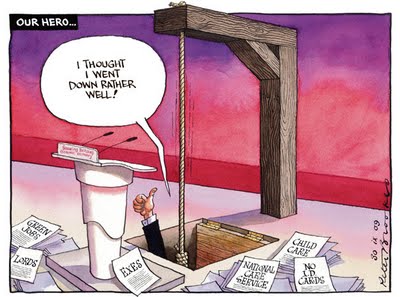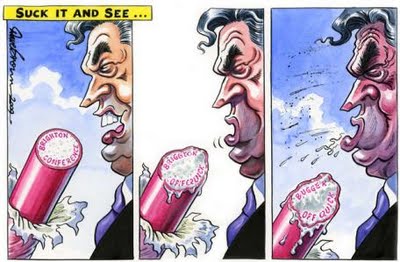Mandelson vs News International.
"There are some in the commercial sector who believe that the future of British media would be served by cutting back the role of the media regulator. They take this view because they want to commandeer more space and income for themselves and because they want to maintain their iron grip on pay-TV, a market in which many viewers feel they are paying more than they should for their music and sport. They also want to erode the commitment to impartiality. In other words, to fill British airwaves with more Fox-style news."
...
"They believe that profit alone should drive the gathering and circulation of news rather than allowing a role for what they call 'state-sponsored journalism'. The government and this bill reject this worldview, and I hope that the whole house, including the Conservatives, will make clear today that they think likewise, and that they will support Ofcom – including its efforts to ensure consumers are getting a fair deal in the pay-tv market."
Whether Murdoch senior and/or junior will directly return fire or not remains to be seen, and if there is one person who might just manage to win in a full-scale war between the two, Mandelson might just be that man, but it is a staggering act of cynicism which causes trouble for all sides. After all, if the Sun had delayed its changing of support to the Tories until next year, there wouldn't be a snowball's chance in hell of Mandelson making any such statement, regardless of its accuracy and regardless also of how NI would still be attacking Ofcom for daring to suggest that it shouldn't have a monopoly on how much it charges for its exclusive content.
The problem this poses though for those of us think Mandelson is exactly right, just for exactly the wrong reasons, is obvious. The Murdochs have, as they usually do, played it perfectly: they identify when something or someone is weak, then move in for the kill, on this occasion on both the BBC and Ofcom at the same time. The power which NI wields was ably illustrated by just how quickly Google decided to roll over and play dead once attacked by Rupert. For Mandelson to now be making the exact same arguments which we should be against increased NI media market dominance runs the risk that we end up looking like New Labour stooges, or that we ourselves have an interest in keeping the status quo. Mandelson's attack also potentially puts the BBC in a difficult position, as it could perpetuate the view that NL has an interest in ensuring it can keep churning out its "state-sponsored journalism", when the nation as a whole has an interest in impartial, free at the point of use news, which is what the BBC provides both online and off to a generally excellent standard, and which the public themselves overwhelmingly choose over the online offerings of a certain News International.
Mandelson does have a point though, when it comes to the Conservatives actually putting forward an intellectual argument for why they have decided to so favour NI over the opposition. So far all they've done is stated what their intentions are without explaining why - which doesn't exactly inspire confidence that they're doing it for any reason other than currying favour with the Murdochs. We certainly haven't heard the last of this, that's for sure.
Labels: BBC, conflicts of interest, media analysis, media ownership, New Labour, News International, Peter Mandelson, Rupert Murdoch




